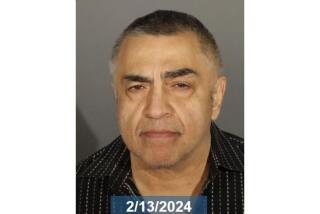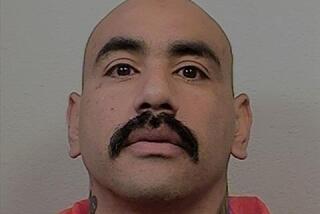After a Decade, DNA Test IDs a Murder Suspect
Rosemary Hom arrived at Amay’s Bakery and Noodle Co. just after 9 on a Saturday morning 10 years ago. She had planned for a long day at the family-owned business that makes and sells fortune cookies, almond cookies and noodles.
Just before pulling her Mazda van into the underground parking garage, Hom waved to a co-worker. But she never entered the shop. A short while later, witnesses told authorities, someone drove the van away.
Hom’s family immediately called police and hospitals in the area. They couldn’t figure out where she would have gone or why she never came in that morning in November of 1994. At 8 p.m., police found Rosemary’s body in the back seat of her van, just a few blocks from the business. She had been stabbed 20 times, stripped of her jewelry and all personal belongings.
Detectives were baffled. The few clues led nowhere. Then earlier this year, prompted by a new tip, Los Angeles Police detectives reopened the case. They pored through the old homicide book and re-interviewed witnesses.
After a few weeks, Dets. Ken Yueng and Alan Solomon, who worked for the department’s Asian Crime Unit, zeroed in on one man -- a former employee at the bakery. Thanh “Michael” Phung, a Vietnamese immigrant, had been fired the year before Hom’s slaying. The 43-year-old had an extensive criminal record. The original detectives had questioned him shortly after the slaying, but Solomon said, “At that point, there was not enough information to indicate whether he was involved.”
The detectives matched Phung’s DNA to blood in the van. On July 1, police arrested him in La Puente, where he lived with his sister’s family. If convicted of murder, he faces a sentence of 26 years to life in state prison. It is not entirely clear why Phung wasn’t given a harder look immediately after the slaying, but in part it was because the family didn’t consider him a prime suspect, Solomon said.
“There’s a certain relief, but now a heartache,” said Hom’s 28-year-old son, Carson Hom. “It’s very disrupting, knowing you can’t treat someone well and they’ll take care of you. What you believe in is in question.”
Rosemary Hom was born Nov. 26, 1951, in Tai Shan, China. The youngest of three children, Hom grew up in Hong Kong -- where she met her husband -- before migrating to the United States in 1970.
“We both worked hard,” said her husband, Jim Hom. “She’d say, ‘You take care of business. I’ll take care of the family.’ I put all my effort into the bakery.”
They had four children, who pitched in with the family’s businesses as early as grade school. The family spent weekends together at their Fillmore orchard, plucking Asian pears and persimmons. When they got older, they began assisting with the bakery and manufacturing plant.
“Everything we did, we did together as a family,” recalled their daughter Doris Hom, 32.
Because Rosemary spoke primarily Cantonese, the children served as translators while they were young. She took them to violin lessons, volunteered in their classrooms and drove them to school. No matter where they went, Carson said, their mother was always at home to greet them when they returned.
After the slaying, the family became more guarded. They bought cellphones, then in their infancy; installed alarm systems; and stayed in daily contact. We were in “constant fear,” said daughter Janet Hom, 29.
Doris quit college after the murder, devoting herself full time to the family and her youngest sister, Connie, who was 12 at the time of the slaying. Jim went back to work.
“Business had to continue. You couldn’t just walk out,” he said. But not a day passed without Rosemary’s family and friends thinking about that November day.
They tried to investigate on their own. They consulted a psychic, whose visions led police to a friend of the family who was cleared of any involvement in the crime.
Detectives also looked into a possible link to a Vietnamese gang that was kidnapping and extorting prominent members of the Asian community. That too was ruled out.
Later, the case was featured on the television show “Unsolved Mysteries.” Still nothing. Without a motive or suspect, the case sat quiet.
Then in January, a family friend contacted police. The Homs were engaged in legal action following a business dispute between Jim and his father over the business. The friend had suggested that a family member may have been involved.
Police reviewed the evidence, including an unidentified blood sample from Rosemary’s van. DNA tests were conducted on the blood, and the result fed into a national computer database. A match was made. It wasn’t until 2003, Solomon said, that Phung’s DNA had been submitted following a felony conviction.
Since Los Angeles police began a concerted campaign to test DNA evidence from unsolved cases, at least 30 people have been charged with murder since November 2001.
The news of Phung’s arrest has rattled Hom’s children. “We all treated him as a friend,” Doris said.
When the Hom family first met Phung, he was a handyman good at repair and maintenance. Phung worked at the bakery for several years, developing a reputation as a solid employee and hard worker. But he had a troubled history.
His first conviction was in 1991 for indecent exposure. In 1997, he was charged with the same crime and sentenced to 16 months in state prison. While he was out awaiting sentencing for that crime, to which he pleaded no contest, he was found guilty of grand theft.
On one occasion, Jim posted bail for Phung.
“I treated him good,” Jim said. “I caught him stealing thousands of dollars, and I had forgiven him. I didn’t report him to police. I thought, ‘Give him a chance. He’ll change.’ ”
Jim fired Phung after he said he caught Phung stealing several cases of almonds. A few months later, Phung tried unsuccessfully to get rehired at the bakery.
Then in the late 1990s, the bakery was remodeling. Phung was part of the work crew. Jim and Phung had a casual conversation.
“I told him it was good he had a job,” Jim said.
At the time of his arrest, Phung was working in construction in the San Gabriel Valley.
Even after the news of Phung’s arrest, Jim still had a hard time believing it. “Why’d he want to kill my wife?”
Doris, now married with a son, doesn’t go through a day without thinking of her mom.
“The happiest day of my life was my wedding day, and she wasn’t there with me,” said Doris, who today can’t speak of her mother without choking up. “I have a baby now. You just wish your mother was there.”
A memorial fund has been set up in Rosemary Hom’s name for students in need. To donate, send checks to the Rosemary Hom Memorial Fund, P.O. Box 41853, Los Angeles, CA 90041.
More to Read
Sign up for Essential California
The most important California stories and recommendations in your inbox every morning.
You may occasionally receive promotional content from the Los Angeles Times.









